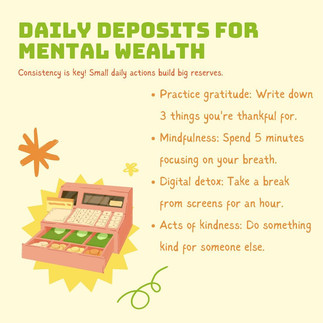In a world where we often hear about financial wealth and investments, a concept just as crucial, yet less discussed, is mental wealth. Mental wealth refers to the emotional, psychological, and social assets we cultivate over time. Just like financial savings can secure a prosperous future, building mental wealth can foster resilience, joy, and a balanced life.
In this blog, we explore what mental wealth is, why it's essential, and how you can nurture it daily to thrive in both personal and professional realms.
What is Mental Wealth?
Mental wealth is a holistic concept encompassing:
Emotional well-being: The ability to manage emotions effectively.
Psychological resilience: Coping with challenges and setbacks.
Social health: Building meaningful relationships and connections.
This mental asset bank isn’t built overnight. Instead, it involves consistent efforts and habits that contribute to our overall psychological health, emotional balance, and social fulfillment.
Why is Mental Wealth Important?
Increases ResilienceMental wealth helps you bounce back from life’s inevitable challenges. When you’ve invested in practices like mindfulness, self-care, and therapy, you’re better equipped to handle setbacks (Bonanno, 2004).
Enhances Emotional RegulationA rich mental wealth bank helps you identify and manage your emotions constructively. This emotional intelligence allows for healthier interactions and improved decision-making (Mayer et al., 2008).
Promotes Long-Term HealthMental wealth is linked to better physical health outcomes, including lower stress levels, better immunity, and improved heart health (Kubzansky et al., 2018).
Strengthens RelationshipsPositive relationships are a significant part of mental wealth. When you prioritize healthy connections, you build a support system that enhances overall well-being (Holt-Lunstad et al., 2010).
Improves Productivity and CreativityMental wealth fosters clarity, focus, and creativity. People who are mentally wealthy are more likely to approach tasks with optimism and find innovative solutions to problems (Fredrickson, 2001).
How to Cultivate Mental Wealth
Here are practical ways to start investing in your mental wealth:
1. Practice Gratitude
Reflecting on what you’re thankful for can increase happiness and decrease negative emotions. Try maintaining a gratitude journal and jotting down three things you’re grateful for each day.
2. Prioritize Self-Care
Self-care isn’t indulgent—it’s essential. Allocate time for activities that rejuvenate you, like reading, exercising, or taking a peaceful walk.
3. Foster Social Connections
Build and nurture relationships that uplift you. Engage in open communication and make time for friends and loved ones who positively impact your mental health.
4. Set Boundaries
Boundaries protect your mental well-being. Learn to say "no" when necessary, and create limits that help you manage stress and maintain balance.
5. Engage in Mindfulness Practices
Mindfulness can reduce anxiety and increase emotional clarity. Techniques like meditation, deep breathing, and yoga help anchor you to the present moment (Kabat-Zinn, 1990).
6. Invest in Therapy or Counseling
Speaking with a mental health professional can provide tools to manage emotional challenges and gain self-insight. Therapy is a proactive way to build mental wealth.
7. Learn New Skills
Challenging yourself with new skills—whether learning a language, cooking, or art—can boost self-esteem and cognitive flexibility (Dweck, 2006).
8. Exercise Regularly
Physical activity has a profound impact on mental health. Exercise releases endorphins, improves mood, and helps combat anxiety and depression (Ratey, 2008).
9. Sleep Well
Prioritize quality sleep to maintain mental clarity, emotional stability, and physical health. Aim for 7-9 hours per night for optimal mental functioning.
10. Practice Positive Self-Talk
The way you speak to yourself matters. Challenge negative thoughts and replace them with affirmations that reinforce self-worth.
Mental Wealth is a Lifelong Journey: (Mental Wealth: Why Investing in Your Mind is Essential)
Building mental wealth is an ongoing process, not a one-time achievement. Just as you wouldn't expect financial security without consistent savings, you can’t expect mental health without regular investment in your well-being.
Take small steps every day, be kind to yourself, and remember that every effort counts toward a richer, more resilient mind. Your mental wealth is your most valuable asset—invest wisely!
Visit www.themindpractice.in for more such mental health related insights.













Comentários